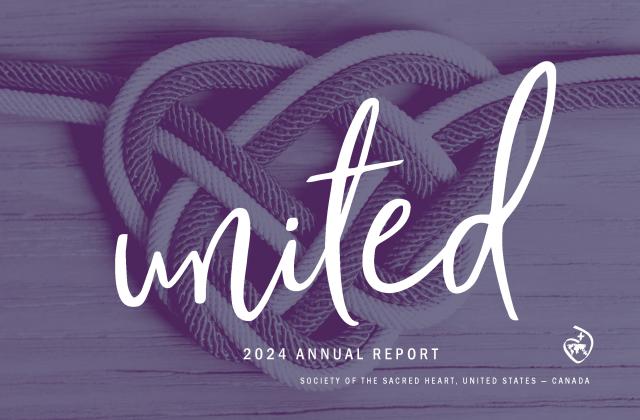To acknowledge our complicity in systems that hurt, diminish, and
disregard others and our earth is a sign of our capacity to respond
to God’s call in a new way – that of strength in weakness. Such
awareness of our personal, communal, congregational, institutional
complicity in unjust systems humbles us. It invites us to be more open
to the transforming work of the Spirit in us and in the world. We are
called to listen and be reconciled, to confront our own sins of racism,
classism and sexism, and from this profound awareness of our weakness
and complicity, to take action with others to advocate for structural
and systemic change.
Being Artisans of Hope in Our Blessed and Broken World
International Justice, Peace, and Integrity of Creation (JPIC)
Society of the Sacred Heart
Dear Family of the Sacred Heart,
We believe that the truth will set us free (John 8:32). Our vows as Religious of the Sacred Heart call us to seek the truth, and, once found, to grapple with its implications and challenges. Compelled by Christ, we are called to build the Kingdom of God where justice reigns. We can only respond to that call with integrity if we are willing first to pursue and confront the truth — most especially the truth of the injustices at the heart of our own story.
To this end, we share with you today the results of the most recent archival research conducted by Maureen Chicoine, RSCJ; Carolyn Osiek, RSCJ; and Emory Webre, in our on-going process to recover the details of our complicity in the evil of enslaving human beings during the early years of the Society in North America. We write today to share this update on the work with our members, associates, staff, alumnae/alumni, and the school communities of theNetwork of Sacred Heart Schools. In our effort to make widely available the historical facts we have uncovered so far, the results of the team’s research have been published on our website here: rscj.org/history-of-enslavement.
We urge everyone to read and reflect prayerfully on these narratives, recognizing that our history is bound irrevocably to our present and our future and we are not free from it. We come from many backgrounds, and the truth of this history may resonate differently for each one of us, depending on our own family histories and individual identities. Nevertheless, as a Sacred Heart family this history also belongs collectively to all of us.
We have provided a series of reflection questions to be used as a guide as we each stand in reverence and sorrow before the human anguish revealed here.(Click here to see the reflection questions.) This grief of the soul is essential to the work of justice. Let our sorrow wake us up and inspire us to confront our own complicity in racism and oppression, to repair the severed relationships caused by injustice and violence, and to resolve to embrace the work necessary for authentic racial reconciliation in our communities.
Our Catholic tradition recognizes that the brokenness of sin requires an intentional, serious process of healing; it is why Reconciliation is a sacrament. It requires an honest recounting of sin (truth telling), a willingness to express remorse for the harm done (contrition), a good-faith attempt to make amends (penance and repair), and a true desire for lasting change (transformation). This process is appropriate for more than an individual’s personal transgressions; it is also a model that can help us begin to reconcile our collective and historical sins. The Sacrament of Reconciliation gives us hope that genuine healing of our community is possible, even in the face of grievous harm.
The process of reconciliation is never simple, easy or quick. However, we do believe that it is possible, and that it must begin by us grappling with the truth of our past. It is the first, necessary step in the process that will lead us through contrition, penance, repair, and finally transformation.
We offer this work of truth telling to you today with courage and confidence because we believe in the strength of our own mission as educators, who do our work out of a deep conviction in the merciful love of God and the solidarity of the human family.
May this holy work of truth seeking be the foundation upon which we begin theserious work of contrition that leads to action for justice, reconciliation, and authentic human solidarity.
United in Christ’s Heart,




